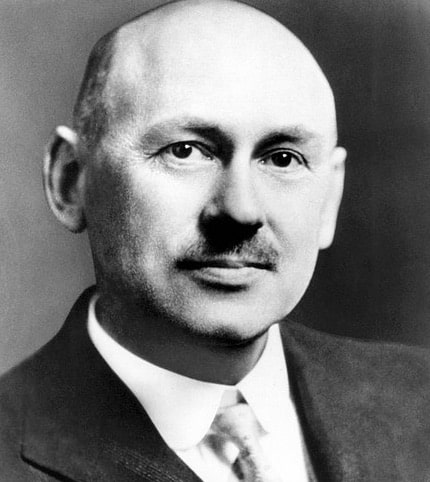
Robert Hutchings Goddard was born on October 5, 1882, in Worcester, Massachusetts, USA. He displayed an early interest in science and experimentation, particularly in the field of physics and aeronautics. In 1908, he graduated with a Bachelor of Science degree from Worcester Polytechnic Institute. After further studies in physics and engineering, he earned, in 1911, a Ph.D. from Clark University.
In 1914, Goddard received a patent for a design related to rocket engines, specifically for liquid-fueled rockets. On March 16, 1926, he successfully launched the world’s first liquid-fueled rocket in Auburn, Massachusetts, reaching an altitude of about 41 feet and a speed of about 60 miles per hour. In the years that followed, Goddard continued to refine his rocket designs and conducted numerous experiments to improve their performance.
Goddard’s work laid the foundation for modern rocketry and space exploration. He introduced key concepts such as the use of a combustion chamber and nozzle to improve rocket engine efficiency. Although his work on rocketry was often met with skepticism and lack of funding during his lifetime, his ideas and inventions were later recognized for their importance. Goddard authored numerous scientific papers and publications on rocketry, including his classic 1919 publication, “A Method of Reaching Extreme Altitudes” that discussed the possibility of reaching space with rockets–a dream that became a reality 38 years later when the USSR launched Sputnik.
Robert H. Goddard is considered a pioneer in the field of astronautics, and his work influenced subsequent generations of rocket scientists and engineers. The Goddard Space Flight Center, a NASA facility located in Greenbelt, Maryland, is named in his honor. He passed away on August 10, 1945, in Baltimore, Maryland, before witnessing the full extent of the impact of his work on space exploration. However, his contributions to rocket science and his visionary ideas played a crucial role in the development of space exploration technology, making it possible for humanity to eventually reach the moon and explore the far reaches of our solar system and beyond.
Reflecting on the nature of human accomplishment, Goddard once asserted: It is difficult to say what is impossible, for the dream of yesterday is the hope of today and the reality of tomorrow. Every vision is a joke until the first man accomplishes it; once realized, it becomes commonplace. The only barrier to human development is ignorance, and this is not insurmountable.
